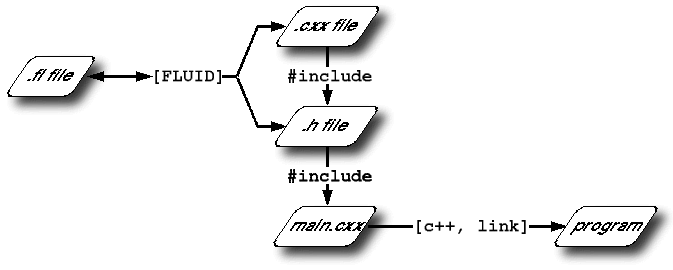Chapter 14. Programming with FLUID
This chapter shows how to use the Fast Light User-Interface Designer ("FLUID") to create your GUIs.
What is FLUID?
The Fast Light User Interface Designer, or FLUID, is a graphical editor that is used to produce FLTK source code.
FLUID edits and saves its state in .fl files. These files are text, and you can (with care) edit them in a text editor, perhaps to get some special effects.
FLUID can "compile" the .fl file into a .cxx and a .h file. The .cxx file defines all the objects from the .fl file and the .h file declares all the global ones.
A simple program can be made by putting all your code (including a main() function) into the .fl file and thus making the .cxx file a single source file to compile. Most programs are more complex than this, so you write other .cxx files that call the FLUID functions. These .cxx files must #include the .h file or they can #include the .cxx file so it still appears to be a single source file.

Normally the FLUID file defines one or more functions or classes which output C++ code. Each function defines a one or more FLTK windows, and all the widgets that go inside those windows.
Widgets created by FLUID are either "named", "complex named" or "unnamed". A named widget has a legal C++ variable identifier as its name (i.e. only alphanumeric and underscore). In this case FLUID defines a global variable or class member that will point at the widget after the function defining it is called. A complex named object has punctuation such as '.' or '->' or any other symbols in its name. In this case FLUID assigns a pointer to the widget to the name, but does not attempt to declare it. This can be used to get the widgets into structures. An unnamed widget has a blank name and no pointer is stored.
Widgets may either call a named callback function that you write in another source file, or you can supply a small piece of C++ source and FLUID will write a private callback function into the .cxx file.